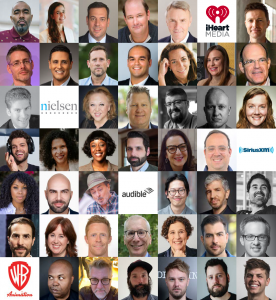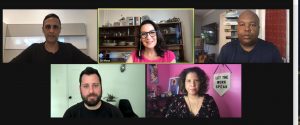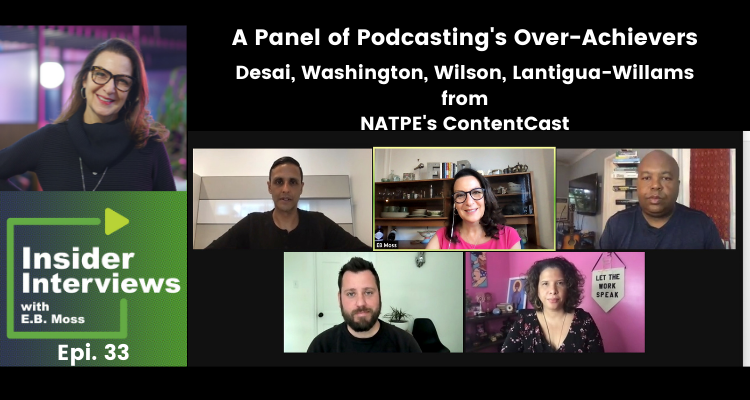Podcast: Play in new window | Download (Duration: 32:48 — 45.1MB) | Embed
Subscribe or Follow Spotify | Android | Pandora | iHeartRadio | TuneIn | Deezer | RSS | More
 I had the good fortune of being asked by NATPE – the global trade association focused on the business of content, to help produce the first ever conference in the media/marketing industry dedicated to the topic of iterating IP from podcasting to TV and back again.
I had the good fortune of being asked by NATPE – the global trade association focused on the business of content, to help produce the first ever conference in the media/marketing industry dedicated to the topic of iterating IP from podcasting to TV and back again.
What the heck does that mean? Well, it’s basically around how TV shows are turning into podcasts to find new audiences and podcasting content has turned into TV shows and films. Think Homeland, Dirty John, even Dirty Diana! So of course I made myself one of the moderators (oh, and a did a little co-hosting with actor Amy Hill (“Magnum, P.I.”)).
But I wanted my panel to feel a little more like a podcast. So you’ll hear some mini-1:1s with major insights from Steve Wilson, Chief Strategy Officer of QCode Media, Shaleen Desai, SVP of Adult Series for Warner Brothers Animation and their Blue Ribbon Content podcast division, Juleyka Lantigua-Williams (yes, from my “bonus episode,”) of Lantigua-Williams & Co., and Glynn Washington, Host/Executive Producer of Snap Judgment Studios.
There’s good news/bad news:
This conference streams free on July 14, 2021. If you missed the full four hour event you’ll want to join NATPE and to play that – and their myriad other conference about the content business, on demand. The good news is that at least you can hear some of THIS panel right here. The bad news? The audio is lifted right off of the conference recording. So some of the quality of the sound might not be perfect, but the quality of the content is excellent.

With that, hear why I called this a panel of over-achievers who will wow you with their accomplishments, and their insights.
Lantigua-Williams: I am the founder of Lantigua-Williams & Co. We’re an independent podcast and film studio, and we adopted the slogan erasing the margins earlier this year, after three years of thinking about what it is that we want to do in the world. And that seemed to fit. We try to tell stories that make it really complicated to put things and people in boxes.
Washington: My name is Glynn Washington. I am the host of Snap Judgment and Snap Judgement Studios. We created the shows Spooked, Heaven’s Gate and Snap Judgement.
Wilson: I’m Steve Wilson. I’m chief strategy officer at QCode Media. We specialize in making original scripted fiction podcasts. We’re really trying to tell new stories, with amazing creators and see them become the next wave of content that we all love in the world.
Desai: I’m Shaleen Desai the senior vice president of Animation at Warner Brothers Animation. I also oversee our company’s scripted podcasts initiative for Warner Media.
Transcript:
Moss: Steve, you spent 15 years at Apple, you’re a font of knowledge. I think that you’re probably putting that to good use at QCode, which is a relatively newer to the industry. So, I wanted to start with you so that you’d give us some building blocks. What inspired you to join QCode and skip retiring with the ‘gold Apple watch’?
Wilson: Well, I certainly did enjoy my time at Apple, working with partners in the content space. I did editorial and partner relations and marketing for apple podcasts for some time. In working with partners, always envisioned myself, going to the publisher side, having the opportunity to, not just be on the platform side, but really work with original stories and amazing partners. Got to work with everyone in the podcast industry, some incredible people, including the panelists here. And, as I looked across the industry, I was fascinated by what QCode was doing.
The company that started about two years ago by a former agent named Rob Herting. And Rob had seen time and again how Hollywood can be risk-averse, and it can be challenging, to start new stories. QCode was founded to try to build new properties and audio experiences for people that the world had never heard before.
And something I’d point out at the top is it’s interesting in all the media that we consume how, fiction plays a really big role — except for in podcasts; fiction tends to be a smaller portion of podcast consumption, and we really see there’s there being a huge opportunity to expand in that area. So, I just had to jump at the chance to join QCode.
Moss: So it’s safe to say that you are bullish on narrative audio. When you and the team are deciding on that content do you do it with an eye to the long tail? How well will it get monetized and will it, you know, play in Peoria and across other platforms?
Wilson: Well, it’s a consideration. We want to tell amazing original stories that there are audiences for that can be really niche and specific content and different verticals. We are building content that’s all different genres — sci-fi through even female erotica, like our show with Demi Moore called Dirty Diana. We think broadly about the different interest areas consumers have. And then when it comes to things like derivatives and TV and film, that’s a consideration though we are primarily focused to ensure that the podcasts that we make is going to work on its own. And we turned down projects that won’t work as a podcast. So we do think about the holistic view of the stories and the content that’s being told though.
Moss: So, it’s not just QCode developing and finding the product, but it’s also those coming to you and you’re looking at it all through that lens of first will it play as a podcast?
Wilson: A hundred percent. Some of them come in as original podcast ideas. Others came from different forms of media to begin with. So, the Left Right Game, for example, was a viral Reddit thread that we developed as a podcast, and it’s now in development, with Amazon. And, we have other projects as well, like Dirty Diana came in as a book. So sometimes the idea for the podcast actually originates in another media type and becomes a podcast and then can go be that other media type as well.
Moss: I want to do something that’s common in marketing podcasts: a little cross-promotion. I want to give props to AdLandia. It’s a great B2B podcast about the industry, (unless you think insider interviews is even better!) You were just on that episode last month and it was packed with great information — and the hosts quoted Malcolm Gladwell, who said, ‘we think with our eyes and feel with our ears.’ Is that also how QCode approaches projects?
Wilson: Yeah, I think so. Of course, Malcolm Gladwell’s is a brilliant person to quote and put things so eloquently. You know, we definitely take a lot of pride in how we put our projects together. So Q code, um, you know, really one of our pillars is rich sound design. We invest heavily in that area. We have a head of music. Is incredible, you know, classically trained pianist, a guy named Darren Johnson. He was touring with Paula Abdul and discovered by Miles Davis. Has done all kinds of work in TV and film, and he’s the one who scores, uh, our podcasts. We also partnered with Adobe on Atmos and Dolby Atmos isn’t even really supported across the industry yet on the distribution side We’ve pre produced all of our contents to really have that immersive sound because we believe that sort of elevates and takes the stories to the next level.
And we’re seeing an increase in that side too, just in the way that TV and film progressed from, you know, television sets and, you know, CTRs up through, you know, 4k HDR. We’re seeing that same increase in audio quality. And we, we make that a core part of the projects we make.
Moss: Excellent. Thank you for being our first mini episodes.
Our second mini episode is Juleyka Lantigua-Williams, and she is someone who has a long tenure in audio coming from NPR. Juleyka, your podcast network is maybe four years old. You just hit a million downloads for Latina to Latina, and you just won one of the first ever Ambies, which is a new award in the podcast industry, with MacMillan Podcasts, for Driving the Green Book. Did you set out to build multi-genre content from the get-go with Lantigua Williams?
Lantigua-Williams: Oh, absolutely. One of the foundational tasks that I set for myself when I was employee one was to only pursue ideas that could be iterated in five different genres. I now have a treasure trove of probably 40 IPs for the first decade of the company that I intend to develop across.
So, yes, I have always been very clear, and I tell people all the time, this is not an audience game. This is an IP game. And when I mentor people and I get to have real conversations about their intent coming into podcasts, I really have to emphasize to them how it is: You live with that by the worth of your ideas not the size of your audience or your downloads. And so for me, it is imperative that we are always thinking in a multi-genre kind of landscape for our original shows. And a lot of our decks to clients for proposals when we’re going out for contracts include derivatives, like, ‘and we could do this at your conference every year. We could do a podcast booth and we could do a video series. And then on year three we can introduce a documentary…’, there’s always that additive at the end so that people can envision what the outgrowth can be from a podcast.
We also produce podcasts for Marvel about geekdom and comic books so the DNA of what we do is based on the notion that there are so many interesting stories that we’re just not getting to hear. How can we shape them through the lens of our experience and our training and journalism? (It has to pass the journalism test. We fact check everything. We make sure that people understand that there are ethical lines that cannot be crossed.)
And so, I think that that brings a certain level of rigor to the storytelling. And so far, we’ve only had a very small foray into fiction. But even that was scrutinized, and so it’s more about the veracity of what we’re saying. And what we discovered, very gleefully, is that when we send things out into the world, the things that we send them out into the world bring back friends, not just the audience. Like, they bring back friends to write checks who want us to make other things with them, they bring back friends who want to invite us to conferences and things like that!
Moss: What’s the best way for a podcaster to present their show for other adaptations?
Lantigua-Williams: Piloting is really, really important for podcasting,
I’ve really have become unequivocal about this; pitch decks are two dimensional and pitch decks rely, unfortunately, on other people’s imagination. You have to pilot the thing, even if just two or three or five minutes, ultimately you have to find the resources and the time, because no one is going to be able in their mind by themselves sitting in front of a laptop.
Moss: Shaleen, you are like our all-star all around. You have more than 20 years in leading scripted unscripted, animation development, TV, film, podcast projects, and you come from an amazing library at Warner Brothers. How do you prioritize what IP you’re going to iterate, especially for podcasts?
Desai: We are lucky in that we have this deep bench of IP, and whether that’s DC or it’s our original kind of films. And that goes back a hundred years. So, it’s, we do have this vast library.
And what we try to look for is where we can service IP for the fans. So, I’ll use Batman as an example: Batman lives in so many different worlds in genres and all that from kids to four-quadrant family to adult, from comic books to television, to films. And so in podcasts, we figured a character like Batman would be a great place to just tell an interesting, different, unique story, and take that kind of really known character and maybe do something that we haven’t quite done on a different format.
So it’s a case by case basis, but we really try to look at it on a bigger more global scale of like, what’s a story, what’s a character that kind of known, but we’re doing something a little different or that we haven’t explored yet.
Moss: Batman is beloved IP. There have been many versions of it. There are a lot of fans out there already doing their own podcasts around it. So how are you going to differentiate your podcast?
Desai: Just to be clear, we’re doing a proper new, original scripted podcast. So it’s not a fan thing or a talking about the IP; it’s actually telling a new and different story, but just doing it in the audio format.
And it first has to stand alone as a different cool, interesting, fun story on its own that the fans will love. And then if it happens to go to television or film, that’s great. That’s icing on the cake, but really it’s to tell this story in a different format, do it for audio.
Moss: What kind of team members have to create a whole new story from this IP?
Desai: Well, we’re lucky in that ad Warner Brothers, you know, we work with so many great, talented filmmakers, television writers, that we have a lot of people that we already are in business with. So we, we do have access to just amazing storytellers and it’s really been getting the word out internally and with our partners that, Hey, we are really interested in exploring scripted podcasting for the company and if there are stories you’ve been wanting to tell, maybe this is a new place to tell those stories.
We’re hoping this will be out by the end of the year but it’s still a little bit TBD.
Moss: What have been your personal biggest learnings about audio given your strong background in video, film, et cetera.
Desai: I come from television, but I’ve always been on the production and the creation side, working with creators, working with writers and all of that. And there are just a lot of things that work in television or film in a visual medium that don’t work for audio. So, it might seem simple to say that, ‘oh, it works for television’, but it’s ‘how many characters do you have in a scene? How would action play out?’ There are certain things that we weren’t used to looking at in reviewing material and reading scripts that we’ve really had to put blinders on and really focus on what is the audio only not the visual element.
So it’s focusing and shifting away from a visual medium into it to hearing how it would sound and then working with sound design and interesting new sound editing and different programs that are coming.
Moss: Glynn Washington, none of the things we’re talking about here would be possible without talent. And I think that you epitomize that – also as an all around. You were humble enough to not mention that you’re one of only three people on the planet to have hit Number One on the iTunes podcast list for three separate programs. so Snap Judgment, Spooked, and Heaven’s Gate – and that of course turned into an HBO docu-series. So what’s more challenging for you, video or audio. How do you think about all of the aspects that go into creating and performing in each medium?
Washington: At this point 10 years into it, I’m all in on the audio side. But I will say my partner, Mark Ristich and I started making short films with a kind of very similar learning curve to what Shaleen was talking about: You can’t have as many characters, you can’t have as much stuff going on. You have to really focus and oftentimes audio really benefits from a single strong lead in a much different way than a film where you can take a more omniscient view than you can oftentimes an audio. We love both. I want a lot of our stuff to be cross-platform, but first and foremost, it’s got to work for us as an audio story.
Moss: What are some of the other through lines of creating a successful podcast?
Washington: Juleyka basically mentioned the idea that whomever you’re pitching stuff to assume they don’t have the imagination to understand it in its various iterations? And you really have to show everyone everything. Everything has to be very, very explicit.
I’ll just give you an example. When we first started Snap Judgment, I used to do the music a lot of time for various stories. I would score things myself. I love scoring stories, but when the pros came in, when they did it, and then I would try to go in there and would be messing with the levels and breaking stuff and learned you got to let the guys who know do their thing.
I wasn’t even able to properly speak their language — of a real musician. It’s hard to realize you’re not even speaking the language of a different platform; you have to accept that.So, go back. Do the work. Figure out how musicians speak differently than poets speak differently than fiction makers speak differently than filmmakers. And, they all speak of differently than studio execs. So you’ve got to understand the language of whoever you’re at you’re talking to.
I mean, you want to maintain your vision. You want to steer your vision. Delegations all well and good, but the energy, the creativity, the fire behind any project is oftentimes bound up in the creators and you never want to lose that.
Moss: Heaven’s Gate. How did that find its way to HBO Max? Were you pitched it, or did you pitch with Pineapple Street to help move things forward?
Washington: Pineapple Street had the idea. It was really flattering and kind of scary at the same time: they came to me, and they said, ‘look, we want to do this cult story, and we thought that you would be a good host for it. If you don’t want to do it, we won’t do the project. But if you want to, we think it’s multi-platform. So, do you have the energy to do this?’ Again, they were right, I did grow up in a cult telling a story that allowed me to revisit kind of my own background in a different way it was very appealing to me. And so, when you start to talk about speaking different languages, they spoke mine when they came to me with the project…
Moss: You heard Glynn talk about growing up in a cult. This is another reason why you should go and read his full bio. Fascinating. Now, we’re all trying to market our content as best as possible. I know touring had been a big thing for you and you were aiming to tour internationally again pre-pandemic. Any advice on growing your listening audience these days?
Washington: Yeah, if you’re on the podcast side, there’s a lot going on. There’s a lot of energy, a lot of things going on. There are a lot of podcasts out there. We are producing 90 new episodes of content this year. So, when people say, how do I break in the podcasting?
I say the way that you break in and the way that you actually get good is get good people, get good writing, get good acting. To get good what you do is you make something that is an homage to something else. If you have figured out the top 10 podcasts in your genre and say, ‘I’m going to make something for them’ and you go to them. If someone came to me in the middle of the summer, when I want to go on break and they say, ‘I have a story that I think will work for Snap’ and I listened to it, and it does? I’m going to kiss you and name all my grandchildren after you! Now, if it doesn’t work, that’s cool too. But you’ve done the thing that you like. Everyone has initially in podcasting tried to make something that sounds like Ira Glass; you should probably do that. And then you go and start doing your own thing. Right now, podcasts are not yet like these crazy elites that you can’t get contact with. You can talk to just about everyone; we’re still like a band of crazy rebels that are fighting against the barricades. And it might not be like that forever. So, I think new people in this place, in this space, should take advantage of the fact that you can still talk to everybody.
Moss: Lightning round questions. Next big category?
Wilson: I’m all in on kids. I think there’s a huge opportunity for kids and families to listen
Desai: I still feel like true crime isn’t going anywhere; it keeps working and working and working.
Washington: I think that supernatural storytelling isn’t going anywhere either. And I also think the story behind music in any way, shape or form you want to do it. I think that song Exploder, living on podcasting and TV and touring the perfect nexus of what we’re talking about.
Lantigua-Williams: I was going to say song Explorer too! But the second one is Two Dope Queens. I mean, come on!
Moss: Shaleen, your favorite cross-platform show or product – Batman not included.
Desai: I still loved Homecoming. That was one of the early ones. I still think it’s one of the best ones done and the fact that it has jumped platforms.
Wilson: Well, I’m going to pick Batman, then — one of my favorites. I’m so excited about your upcoming podcast, Shaleen!
Next up? See you in person at Podcast Movement 21 – where I’ll ALSO be speaking virtually on B2B podcasting!
THANK YOU FOR LISTENING AND SHARING THE WISE WORDS OF ALL MY GUESTS!
If you found this content helpful, and like Insider Interviews episodes, please add a review on Apple, share this episode, and of course feel free to “buy me a coffee!”: https://buymeacoffee.com/mossappeal
If I can help you connect YOUR podcast/tv/content dots, or just get started, please reach out to me at podcasts@mossappeal.com
Please E.B. Moss and Insider Interviews follow on:
Twitter:
@mossappeal
@InsiderIntervws
IG:
@insiderinterviews
@mossappeal
Facebook: InsiderInterviewsPodcast


